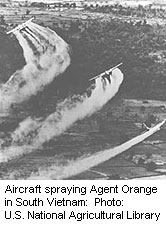- 8 Ways to Increase Dopamine Naturally
- 7 Best Breads for Maintaining Stable Blood Sugar
- Gelatin vs. Collagen: Which is Best for Skin, Nails, and Joints?
- The Long-Term Effects of Daily Turmeric Supplements on Liver Health
- Could Your Grocery Store Meat Be Causing Recurring UTIs?
- Are You Making This Expensive Thermostat Error This Winter?
- Recognizing the Signs of Hypothyroidism
- 10 Strategies to Overcome Insomnia
- Could Artificial Sweeteners Be Aging the Brain Faster?
- Techniques for Soothing Your Nervous System
Skin Cancer Risk Seen in Vietnam Vets Exposed to Agent Orange


U.S. veterans of the Vietnam War who were exposed to the herbicide Agent Orange may be at increased risk for skin cancer, a new study warns.
Agent Orange was a chemical spray that was widely used during the Vietnam War to clear foliage in the jungle. It contained a known carcinogen called dioxin, and has been linked to a wide range of cancers and other diseases.
Researchers analyzed the medical records of 100 men who joined the Agent Orange registry at the Veterans Affairs Hospital of Washington, D.C., between August 2009 and January 2010. The men lived or worked in contaminated areas (56 percent), were involved in the spraying of Agent Orange (30 percent), and traveled in contaminated areas (14 percent).
Only men with lighter skin types were included in the study.
The rate of non-melanoma invasive skin cancer among these veterans was 51 percent, which is about twice as high as among same-aged men in the general population. The risk of skin cancer was highest (73 percent) among veterans who were involved in the spraying of Agent Orange. The risk was also higher among men with the lightest skin types and lighter eyes.
Forty-three percent of the study participants had a skin condition called chloracne, which is caused by exposure to dioxins, the investigators found. In this group of men, the rate of non-melanoma invasive skin cancer was more than 80 percent.
But for malignant melanoma, which is the most dangerous type of skin cancer, the researchers found no increased risk. The rate of this type of deadly cancer among the veterans exposed to Agent Orange was similar to that among men of similar age in the general population, the study authors noted in a journal news release.
The findings were published in the February issue of the journal Plastic and Reconstructive Surgery.
However, two of the veterans had unusually aggressive non-melanoma invasive skin cancer with many recurrences that required numerous surgeries, the report revealed.
The findings add to previous evidence that people exposed to Agent Orange are at increased risk for non-melanoma invasive skin cancer, even decades after exposure, concluded Dr. Mark Clemens, of the University of Texas M.D. Anderson Cancer Center, and colleagues.
“Further studies are warranted to determine the relative risk within this patient population and to determine appropriate management strategies so that veterans may receive the care they earned in service,” the study authors wrote.
More information
The U.S. Department of Veterans Affairs has more about Agent Orange.
Source: HealthDay
Copyright © 2026 HealthDay. All rights reserved.










